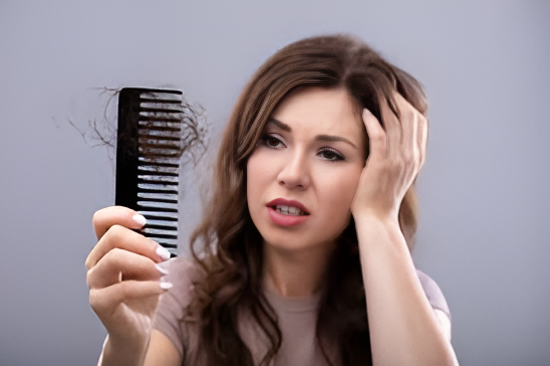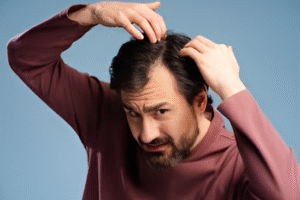
Millions of people worldwide suffer from hair loss, which can be upsetting and impact one’s confidence and self-esteem. Whether it’s a few strands in the shower or noticeable thinning over time, hair loss can be minimized and healthy hair growth encouraged by knowing the underlying causes and implementing a good hair care regimen.
This article examines the causes of hair loss, prevention advice, and simple natural remedies that can be done at home.

What Is Hair Fall?
The excessive shedding of hair from the scalp or other areas of the body is referred to as hair fall or hair loss. Losing 50 to 100 hairs a day is normal, but if this amount rises and hair begins to thin or bald spots show up, there may be a problem at hand.
Men, women, and even children may have temporary or permanent hair loss.
Common Causes of Hair Fall
The first step in treating hair loss is to comprehend its causes. These are the most typical reasons:
1. Genetics (Hereditary Hair Loss)
Androgenic alopecia, sometimes referred to as male or female pattern baldness, is the most prevalent kind of hair loss. It normally develops gradually over time and is inherited from the family.
2. Hormonal Imbalances
Excessive hair loss may result from hormonal changes brought on by pregnancy, childbirth, menopause, thyroid conditions, or polycystic ovarian syndrome (PCOS).
3. Stress and Lifestyle Factors
Telogen effluvium, or transient hair loss, can be brought on by emotional or physical stress, sleep deprivation, and unhealthy lifestyle choices.
4. Nutritional Deficiencies
Hair loss can result from a deficiency in vital nutrients such protein, iron, zinc, vitamin D, and B-complex vitamins, which damage hair roots.
5. Medical Conditions
Sudden and patchy hair loss can be caused by autoimmune illnesses, scalp infections, or alopecia areata.
6. Hair Styling and Chemicals
Hair breakage and fall can result from frequent use of harsh shampoos, tight hairstyles, heat styling appliances, and chemical treatments.
7. Medications and Treatments
Hair loss is a side effect of some drugs, such as those used to treat cancer, depression, high blood pressure, or arthritis.
How to Prevent Hair Fall
There are numerous ways to lessen the severity of hair loss and encourage healthy growth, even though not all forms of it can be avoided:
1. Eat a Balanced Diet
Eat a diet high in zinc, biotin, iron, protein, and vitamins A, C, D, and E. Incorporate foods such as fruits, dairy, leafy greens, nuts, eggs, and seeds.
2. Keep Your Scalp Clean and Healthy
Wash your scalp two or three times a week with a gentle, sulfate-free shampoo. Avoid washing too much as this can remove natural oils.
3. Avoid Heat and Chemicals
Use of hair dyes, curlers, and straighteners should be limited. Use a heat protectant when employing heat.
4. Stay Hydrated and Stress-Free
Engage in stress-relieving exercises like yoga, meditation, or deep breathing, and drink lots of water.
5. Oil Your Hair Regularly
Oil massages nourish hair roots and improve blood circulation in the scalp. Make use of oils such as castor, almond, coconut, or bhringraj.
Natural Remedies for Hair Fall
The following are some efficient natural hair loss management home remedies:
1. Vera aloe
Aloe vera encourages hair development and balances the pH of the scalp. Before shampooing, apply fresh aloe gel to your scalp and let it sit for half an hour.
2. Juice from onions
Onion juice, which is high in sulfur, increases blood flow to hair follicles. After applying to the scalp and letting it sit for 15 to 20 minutes, rinse with a gentle wash.
3. Methi, or fenugreek seeds
Apply fenugreek seeds to the scalp after soaking them for the entire night and grinding them into a paste. After half an hour, rinse off. Dandruff is avoided ,and hair roots are strengthened.
4. Milk from coconuts
Coconut milk has a lot of fat and protein. Apply to the hair and scalp, let sit for 20 minutes, and then rinse with a gentle shampoo.
5. Indian gooseberry, or amla
Amla is rich in antioxidants and vitamin C. Apply a mixture of lime juice and amla powder to the scalp, then rinse it off after 20 minutes.
When to See a Doctor
f your hair fall is:
- Sudden and severe
- Associated with other symptoms like weight loss, fatigue, or scalp itching
- Leaving bald patches
- Continuing for more than a few months despite remedies
…it’s best to consult a dermatologist or trichologist. They can identify the root cause through blood tests, scalp analysis, or biopsies and suggest suitable treatment.
Medical Treatments for Hair Loss
The following therapies may be taken into consideration in severe or protracted cases:
- A topical medication called minoxidil (Rogaine) promotes hair growth.
- Male pattern baldness can be treated with finasteride, an oral drug.
- Injections that stimulate hair follicles using your own blood are known as platelet-rich plasma (PRP) therapy.
- Bald areas can be permanently restored with hair transplant surgery.
- Low-level laser devices are used in laser therapy to stimulate hair growth.
Use these remedies only under a doctor’s supervision.
Conclusion
Although hair loss is normal, severe loss should not be disregarded. It is possible to lessen hair loss and encourage stronger, healthier hair with the correct combination of diet, gentle care, and lifestyle adjustments.
Even while Ayurvedic treatments and home cures can be very effective, if the disease continues, don’t be afraid to get expert assistance. Your confidence can be restored and your hair saved with early diagnosis and care.
More information : Health tips , Entertainment, food






